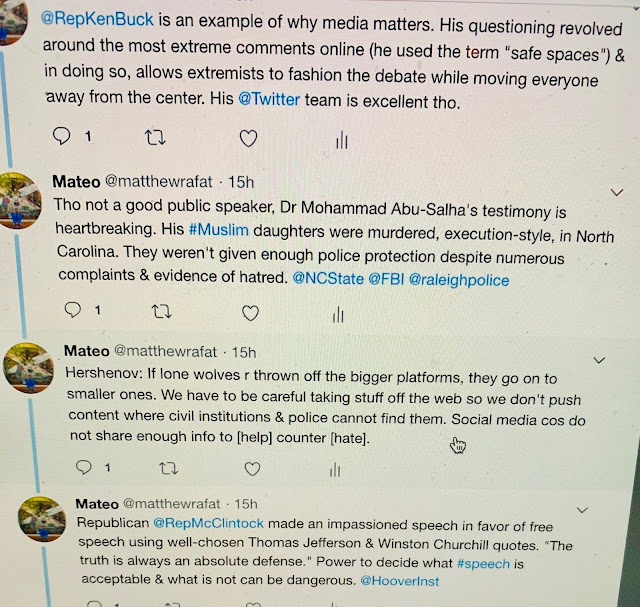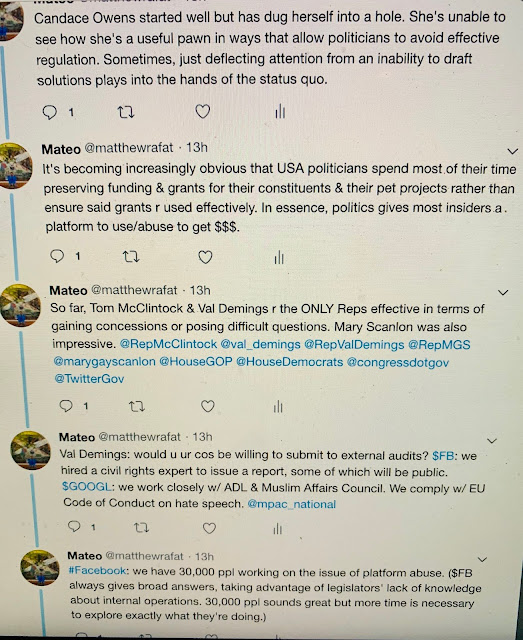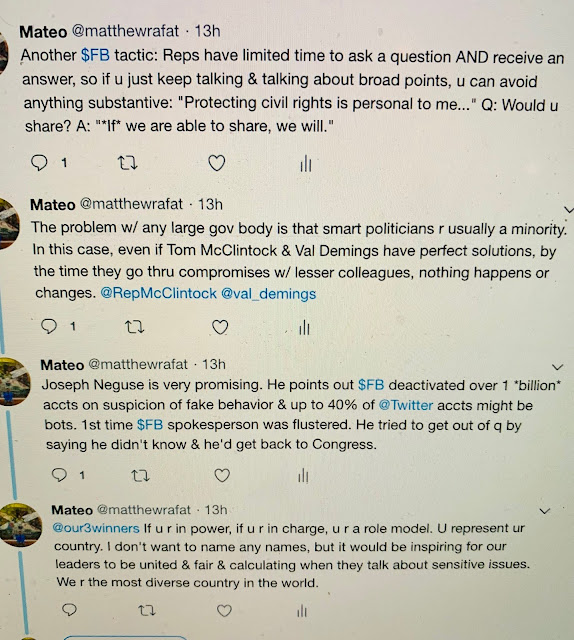Facebook held its annual meeting today in trendy Menlo Park-based Hotel Nia.
Shareholders were treated to Clover yoghurt, pastries (mostly croissants), tea, coffee, and a granola mix.
Zuckerberg entered with the board of directors, smiling. An employee introduced the shareholder proposals and their advocates. After one advocate spoke about a shooting at her religious institution, which she believes was fueled by Facebook's failure to adequately police "hate speech," the emcee immediately acknowledged the horrific event and "evil" acts of extremism. He vowed Facebook would not allow people to attack others based on religious, ethnic, racial, or other legally-protected classes.
Zuckerberg's speech was the highlight. He said 2019 was a busier year than usual, with the company (unwantedly) being at the center of social issues. Though he didn't mention that Facebook removed 2.2 billion (fake) accounts this year, the company's worldwide reach is still potent: 2.7 billion people use Facebook once a month, and over 1 billion people use it daily.
Zuckerberg said the company was focusing on four areas:
1. Progress on social issues. (e.g., content and safety, election interference, privacy controls, data portability)
2. Qualitative new experiences. (e.g., new platforms, new ways of communicating)
3. Serving small businesses around the world. (90 million small businesses worldwide now use Facebook's marketing tools for free.)
If Facebook deserves kudos in any area, it's this one. I've seen numerous small businesses, especially restaurants and cafes, advertising to English-speaking tourists with both the Twitter and Facebook logos, no small feat given the translation and mapping issues inherent in international advertising.
4. Be more transparent. (Give people a voice but keep people safe.)
Executive bonuses will be tied to performance in the above four areas, but it's common for compensation committees everywhere to create key performance indicators (KPIs).
Zuckerberg's most poignant comment related to the current state of social media:
If the rules for the internet were getting re-written from scratch today, I don’t think that most people would want private companies to be making so many decisions by themselves about what constitutes acceptable speech.
Following this welcome admission, Zuckerberg practically begged governments worldwide to create regulatory frameworks, later mentioning he'd discussed these issues in Paris with France's Emmanuel Macron.
Moving forward, Facebook's vision is to build a privacy-focused social platform over the next five to ten years, adding the digital equivalent of a "living room." Whereas Facebook and Instagram have been akin to a "town square" (at one point Zuckerberg misspoke, using "Times Square," an interesting slip given the massive advertising in that particular NYC area), the goal is to provide users with a more private setting should they want one.
While earnest, Zuckerberg has not proposed a dramatic change. Years ago, users could create private groups within Facebook and restrict posts based on self-made filters, but it was time-consuming and non-intuitive. Furthermore, creating a separate, more private space with "different controls" within Facebook and Instagram seems contrary to Facebook's stated aim of gathering all posted data to assist it in selling ads and exposure. Even so, Zuckerberg consistently promoted the creation of "private platforms as developed and rich as public ones today," giving users the "ability to interact with people privately."
Interestingly, in a speech transmitted from Russia into Canada today, Edward Snowden had this to say: "Everyone thinks Facebook is spying on them... they're absolutely right, but so is Amazon [and everyone else online]. But now we are aware of the problem."
Snowden didn't stop there: "Facebook is in flagrant violation of [the EU's privacy law of] GDPR, [they] haven't made their site compliant because they know they [their lawyers] can drag it out for 10 years, after which the laws will have changed."
The Q&A session was limited, and Facebook cut off about six people who wanted to speak. Troublingly, the rules only allowed each shareholder one minute to ask one question, far below the usual two to three minutes given to shareholders, as well as a more liberal stance on follow-up questions.
Sheryl Sandberg, one of the most insipid executives in American history, commenced her usual strategy of avoiding questions and giving as bland or broad a response as possible. In response to one shareholder, she said, we "don't allow hate in any form," not bothering to address how Facebook would avoid being arbitrary or overbroad in the application of such a general policy.
In contrast, Zuckerberg was measured and nuanced, openly asking, "What is the right framework..." "that will enable us to solve this issue?" He seemed to answer his own question when he mentioned an independent tribunal that would issue binding decisions (without appeal), taking the matter out of Facebook's purview.
A shareholder asked about voice-based applications, prompting Zuckerberg to say voice will be more important over the years, but he had "nothing specific today" [to showcase].
I pointed out that Facebook's Board of Directors had no one with experience in journalism, ethics, or books--all dying fields, in no small part because of Facebook.
Out of the seven directors not named Sandberg or Zuckerberg, three (Marc Andreessen, Kenneth Chenault, and Peggy Alford) had finance or VC backgrounds, while the others worked in philanthropy (Susan Desmond-Hellmann), surveillance (Peter Thiel, Palantir), and politics (Jeffrey Zients). I said it wasn't Zuckerberg's fault that Facebook--despite its funding by In-Q-Tel to advance facial recognition technology--had reduced privacy. Issues had begun with the Church Committee investigations in the 1970s, but it was indeed his fault that Facebook had destroyed journalism, and I asked what he planned on doing about it. After a second, Zuckerberg threw up his hands, a signal for Sandberg to get involved, and she delivered an asinine answer about the "internet" making journalism's business model more difficult. (Sandberg might want to talk to Marc Andreessen, who nurtured internet consumer use, about journalism from 1995-2010, when the internet brought readers new websites like Salon.com.)
I had slipped in a question about spinning off WhatsApp into a separate, independent company, and Sandberg brushed off this question, too, referring me to Facebook's previous statements on the matter.
Overall, it was an interesting shareholder meeting, though too short, and not as nuanced as it should have been. Given its selection of directors, it seems likely Facebook will be moving aggressively into digital payments and financial platforms, leaving ethics and journalism behind. If I'm right, expect more of the same in 2020 as in 2016. In the meantime, I'll be over on Twitter, where CEO Jack Dorsey has more effectively upheld user privacy while railing against government surveillance.
Disclosures: I own an insignificant number of Twitter (TWTR) and Facebook (FB) shares. Nothing herein constitutes investment advice. As of the date of publication (May 30, 2019), I was not paid for this post by anyone, nor did I receive or anticipate receiving advertising dollars for it.
© Matthew Rafat (2019)
 |
| Hotel Nia is behind the angry emoji balloon |
Zuckerberg entered with the board of directors, smiling. An employee introduced the shareholder proposals and their advocates. After one advocate spoke about a shooting at her religious institution, which she believes was fueled by Facebook's failure to adequately police "hate speech," the emcee immediately acknowledged the horrific event and "evil" acts of extremism. He vowed Facebook would not allow people to attack others based on religious, ethnic, racial, or other legally-protected classes.
 |
| No photos allowed. I don't know exactly how this photo was taken. |
Zuckerberg said the company was focusing on four areas:
1. Progress on social issues. (e.g., content and safety, election interference, privacy controls, data portability)
2. Qualitative new experiences. (e.g., new platforms, new ways of communicating)
3. Serving small businesses around the world. (90 million small businesses worldwide now use Facebook's marketing tools for free.)
If Facebook deserves kudos in any area, it's this one. I've seen numerous small businesses, especially restaurants and cafes, advertising to English-speaking tourists with both the Twitter and Facebook logos, no small feat given the translation and mapping issues inherent in international advertising.
4. Be more transparent. (Give people a voice but keep people safe.)
Executive bonuses will be tied to performance in the above four areas, but it's common for compensation committees everywhere to create key performance indicators (KPIs).
Zuckerberg's most poignant comment related to the current state of social media:
If the rules for the internet were getting re-written from scratch today, I don’t think that most people would want private companies to be making so many decisions by themselves about what constitutes acceptable speech.
Following this welcome admission, Zuckerberg practically begged governments worldwide to create regulatory frameworks, later mentioning he'd discussed these issues in Paris with France's Emmanuel Macron.
Moving forward, Facebook's vision is to build a privacy-focused social platform over the next five to ten years, adding the digital equivalent of a "living room." Whereas Facebook and Instagram have been akin to a "town square" (at one point Zuckerberg misspoke, using "Times Square," an interesting slip given the massive advertising in that particular NYC area), the goal is to provide users with a more private setting should they want one.
While earnest, Zuckerberg has not proposed a dramatic change. Years ago, users could create private groups within Facebook and restrict posts based on self-made filters, but it was time-consuming and non-intuitive. Furthermore, creating a separate, more private space with "different controls" within Facebook and Instagram seems contrary to Facebook's stated aim of gathering all posted data to assist it in selling ads and exposure. Even so, Zuckerberg consistently promoted the creation of "private platforms as developed and rich as public ones today," giving users the "ability to interact with people privately."
Interestingly, in a speech transmitted from Russia into Canada today, Edward Snowden had this to say: "Everyone thinks Facebook is spying on them... they're absolutely right, but so is Amazon [and everyone else online]. But now we are aware of the problem."
Snowden didn't stop there: "Facebook is in flagrant violation of [the EU's privacy law of] GDPR, [they] haven't made their site compliant because they know they [their lawyers] can drag it out for 10 years, after which the laws will have changed."
The Q&A session was limited, and Facebook cut off about six people who wanted to speak. Troublingly, the rules only allowed each shareholder one minute to ask one question, far below the usual two to three minutes given to shareholders, as well as a more liberal stance on follow-up questions.
Sheryl Sandberg, one of the most insipid executives in American history, commenced her usual strategy of avoiding questions and giving as bland or broad a response as possible. In response to one shareholder, she said, we "don't allow hate in any form," not bothering to address how Facebook would avoid being arbitrary or overbroad in the application of such a general policy.
In contrast, Zuckerberg was measured and nuanced, openly asking, "What is the right framework..." "that will enable us to solve this issue?" He seemed to answer his own question when he mentioned an independent tribunal that would issue binding decisions (without appeal), taking the matter out of Facebook's purview.
A shareholder asked about voice-based applications, prompting Zuckerberg to say voice will be more important over the years, but he had "nothing specific today" [to showcase].
I pointed out that Facebook's Board of Directors had no one with experience in journalism, ethics, or books--all dying fields, in no small part because of Facebook.
Out of the seven directors not named Sandberg or Zuckerberg, three (Marc Andreessen, Kenneth Chenault, and Peggy Alford) had finance or VC backgrounds, while the others worked in philanthropy (Susan Desmond-Hellmann), surveillance (Peter Thiel, Palantir), and politics (Jeffrey Zients). I said it wasn't Zuckerberg's fault that Facebook--despite its funding by In-Q-Tel to advance facial recognition technology--had reduced privacy. Issues had begun with the Church Committee investigations in the 1970s, but it was indeed his fault that Facebook had destroyed journalism, and I asked what he planned on doing about it. After a second, Zuckerberg threw up his hands, a signal for Sandberg to get involved, and she delivered an asinine answer about the "internet" making journalism's business model more difficult. (Sandberg might want to talk to Marc Andreessen, who nurtured internet consumer use, about journalism from 1995-2010, when the internet brought readers new websites like Salon.com.)
I had slipped in a question about spinning off WhatsApp into a separate, independent company, and Sandberg brushed off this question, too, referring me to Facebook's previous statements on the matter.
Overall, it was an interesting shareholder meeting, though too short, and not as nuanced as it should have been. Given its selection of directors, it seems likely Facebook will be moving aggressively into digital payments and financial platforms, leaving ethics and journalism behind. If I'm right, expect more of the same in 2020 as in 2016. In the meantime, I'll be over on Twitter, where CEO Jack Dorsey has more effectively upheld user privacy while railing against government surveillance.
Disclosures: I own an insignificant number of Twitter (TWTR) and Facebook (FB) shares. Nothing herein constitutes investment advice. As of the date of publication (May 30, 2019), I was not paid for this post by anyone, nor did I receive or anticipate receiving advertising dollars for it.
© Matthew Rafat (2019)
Bonus: "What Facebook has become is the press's assignment editor, its distribution network, its great antagonist, devourer of its ad revenue, and, through corporate secrecy, a massive block to journalism's core mission of democratic accountability." -- Jacob Silverman (2020)
Bonus, from New York Times' 2018 annual report, pp. 26.
Bonus, from New York Times' 2018 annual report, pp. 26.















